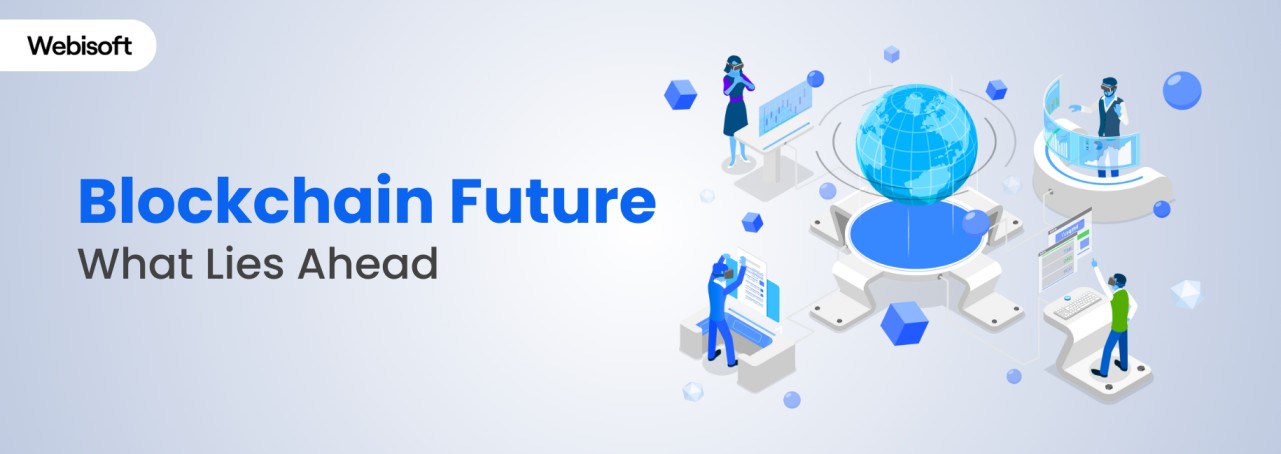Did you know that the blockchain market, valued at just USD 4.67 billion in 2021, is projected to reach an astonishing USD 163.83 billion by 2029? Are you curious to know more about its future potential?
Blockchain has incredible potential. It can make supply chains more efficient, keep healthcare data safe, change how money is handled, and create new business approaches. Its decentralized design empowers people and companies, transforming industries and trust in the digital era.
In this article, we will explore the blockchain future. We’ll look at its significance today, predict where it’s going in the next five years, and discuss ongoing debates. By the end, you’ll get an idea of blockchain’s future. Let’s start!
Contents
- 1 What is Blockchain Technology?
- 2 Importance of Blockchain in the Current Era
- 3 Where Will Blockchain Technology Be in 5 Years?
- 4 Future of Blockchain and Cryptocurrency
- 5 Blockchain Future in 2024
- 6 Debates Surrounding Blockchain’s Future
- 7 Will There Be a High Demand for Experts in Blockchain?
- 8 Conclusion
- 9 FAQs
What is Blockchain Technology?
Blockchain technology is a decentralized and distributed ledger system. It consists of a chain of blocks, each containing a list of transactions. What makes it unique is its decentralized nature, where no single entity or authority has control. Instead, it relies on a network of computers (nodes) to validate and record transactions, ensuring transparency and security.
Blockchain technology is known for its key features like decentralization, transparency, immutability, security through cryptography, and the ability to execute smart contracts with predefined rules.
Importance of Blockchain in the Current Era
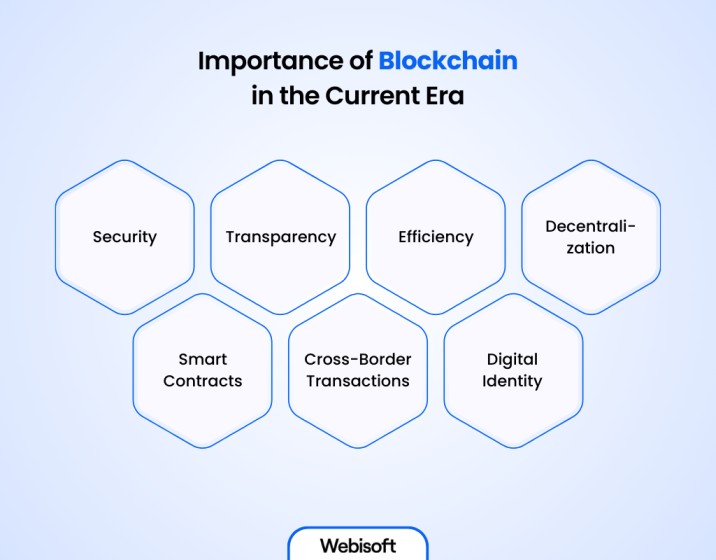
Blockchain technology is playing a vital role in the current times, bringing about significant changes across different sectors. Its importance becomes especially clear in several areas:
Security
Blockchain relies on strong cryptographic techniques to ensure data integrity and security. This approach effectively reduces the risks associated with fraud and unauthorized alterations, making it a crucial tool for protecting sensitive information and transactions.
Transparency
One notable feature of blockchain technology is its transparency. Everyone who has permission can see all transactions logged on the blockchain, which promotes trust and responsibility. This transparency reduces the reliance on traditional intermediaries to confirm and monitor transactions.
Efficiency
Blockchain simplifies processes by eliminating unnecessary paperwork and reducing delays. This efficiency is especially evident in industries like supply chain management and financial transactions, where blockchain streamlines complex procedures.
Decentralization
Blockchain’s removal of central authorities empowers individuals and entities, granting them more control over their data and assets. It also minimizes the risk of a single point of failure, bolstering overall system resilience.
Smart Contracts
Blockchain enables the execution of smart contracts—self-executing agreements with predefined rules and conditions. These contracts automate processes, reducing the reliance on intermediaries in various legal agreements, particularly in the legal and financial sectors.
Cross-Border Transactions
In today’s interconnected world, blockchain simplifies cross-border transactions, making them faster and more cost-effective. Its capacity to eliminate intermediaries and streamline cross-border payments is invaluable for businesses and individuals engaged in international trade and finance.
Digital Identity
Blockchain has the potential to revolutionize digital identity management. It can provide secure and portable digital identities, enhancing online privacy. This reduces the risks associated with identity theft and data breaches.
As you know the importance now, if you want to cope with the digital era then try to incorporate blockchain into your business. To do so the best solution for you is Webisoft.
Where Will Blockchain Technology Be in 5 Years?
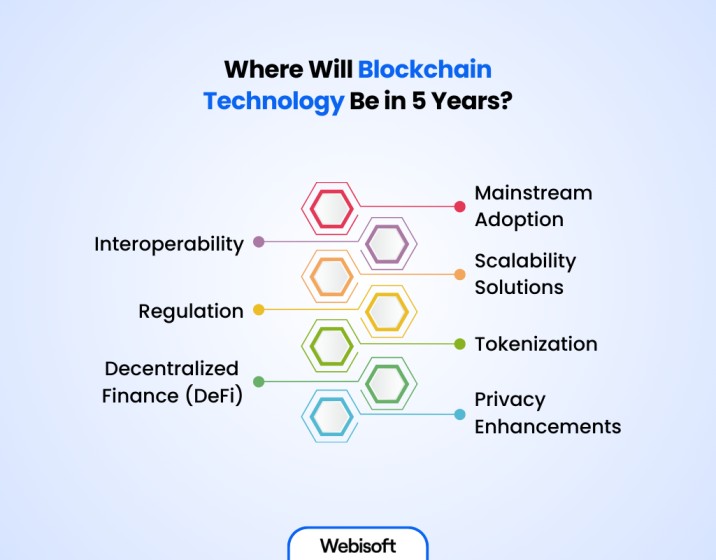
In the next five years, blockchain technology is poised for significant growth and evolution. Here are some potential developments:
Mainstream Adoption
Blockchain is likely to become an integral part of our daily lives. We can expect to see widespread adoption across various industries, including finance, supply chain, and healthcare. Its applications may extend to areas like identity verification, voting systems, and more.
Interoperability
Blockchain platforms are on a trajectory to achieve improved interoperability. This means that different blockchain networks will become more compatible with each other, making it easier to transfer data and assets seamlessly across various platforms.
Scalability Solutions
Scalability has been a challenge for blockchain, particularly in handling a high volume of transactions. In the next five years, solutions such as sharding and Layer 2 protocols are expected to address scalability issues, ensuring faster and more efficient transactions.
Regulation
Governments and regulators might get more involved in blockchain. They could make rules clearer to protect consumers while supporting new ideas. This could make the blockchain area more stable for growth.
Tokenization
Blockchain’s potential to tokenize real-world assets, including real estate, art, and other investments, may become more accessible to a broader range of individuals. This could democratize investments and enhance liquidity in traditionally illiquid markets.
Decentralized Finance (DeFi)
DeFi platforms are set to expand further, offering an increasing array of financial services without the need for traditional intermediaries. This could disrupt traditional financial systems and provide greater financial inclusivity.
Privacy Enhancements
Privacy-focused blockchain solutions will continue to evolve. These advancements aim to provide better protection for user data, addressing growing concerns about data privacy and security.
Future of Blockchain and Cryptocurrency
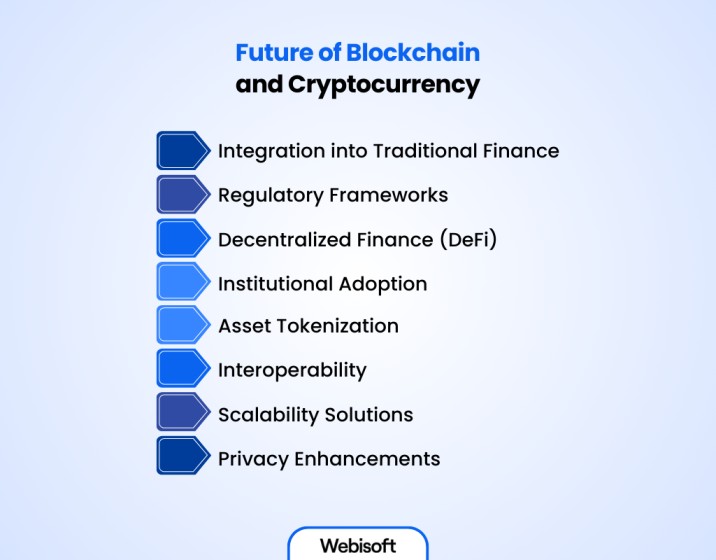
Cryptocurrency and blockchain future growth holds significant promise. Here are key insights into what we can expect:
Integration into Traditional Finance
Cryptocurrencies and blockchain technology are progressively finding their place within conventional financial systems. Expect more financial institutions to offer cryptocurrency-related services, including trading and secure custody.
Regulatory Frameworks
Governments worldwide are actively working on establishing well-defined regulatory frameworks for cryptocurrencies. This effort aims to create a more stable and secure environment for investors and businesses, potentially leading to broader adoption.
Decentralized Finance (DeFi)
DeFi platforms are projected to sustain their growth, providing decentralized lending, borrowing, and trading services. DeFi has the potential to disrupt traditional banking systems and democratize access to financial services.
Institutional Adoption
Institutional investors are increasingly expressing interest in cryptocurrencies. Greater participation from institutional leaders may contribute to improved liquidity and stability in the cryptocurrency market.
Asset Tokenization
The tokenization of tangible assets, such as real estate and art, is expected to become more prevalent. This can transform traditionally illiquid assets into more accessible and tradable forms.
Interoperability
Blockchain networks are actively working on improving interoperability, enabling seamless communication and transactions between diverse blockchains. This advancement aims to boost overall efficiency within the blockchain ecosystem.
Scalability Solutions
Scalability remains a challenge for blockchain networks. Solutions like sharding and Layer 2 protocols are under development to address this issue and increase transaction processing capabilities.
Privacy Enhancements
Blockchain solutions that focus on keeping information private are getting better. They use special technology like zero-knowledge proofs and complex codes to improve. The goal is to make data more secure and protect privacy.
Blockchain Future in 2024
Blockchain is still new but has big plans to change many areas. We’re looking at some cool ways it might be used in 2024.
Here’s what could happen with blockchain in 2024:
In Banking
Right now, blockchain helps keep track of money safely and openly. By 2024, it might bring us new ways to save, borrow, and insure money without the usual banks.
In Supply Chains
Blockchain helps ensure the things we buy are real and tracks where they come from. By 2024, it could make buying and selling things clearer and smoother.
In Government
Countries are trying out blockchain to keep data safe and make things clearer. By 2024, it might help make government work better and safer.
In Healthcare
Blockchain keeps medical records safe today. In 2024, it might help with new healthcare ideas, like running medical tests all over the world or keeping health records in a new way.
With IoT (Internet of Things)
Blockchain helps gadgets talk to each other safely. By 2024, there might be new ways for our devices to connect and share data with blockchain’s help.
Debates Surrounding Blockchain’s Future
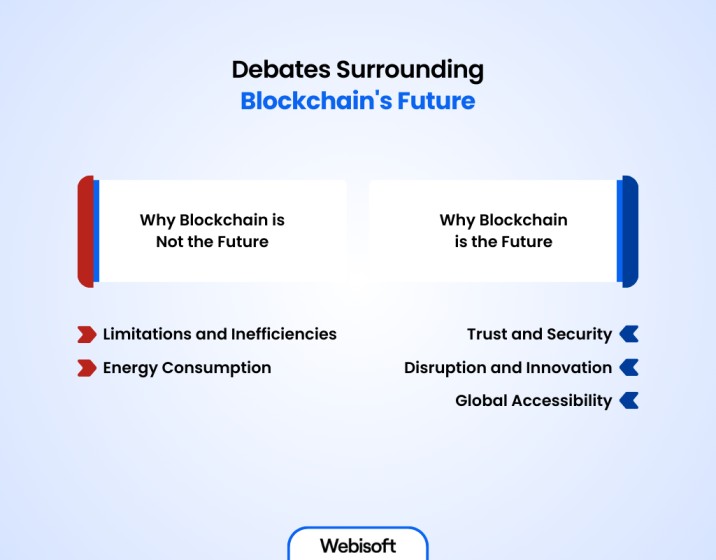
While blockchain technology holds significant promise, it is a topic of intense debate regarding whether it truly represents the future or not. Here, we delve into both sides of the argument:
Why Blockchain is Not the Future?
Let’s explore the criticisms and limitations of blockchain technology:
Limitations and Inefficiencies
Critics argue that blockchain exhibits limitations, including scalability issues and inefficiencies. In specific use cases, traditional centralized systems may provide more efficient solutions, rendering blockchain less suitable for every application.
Energy Consumption
The energy-intensive nature of certain blockchain networks, particularly those employing proof-of-work consensus mechanisms, has raised environmental concerns. Some view the substantial energy consumption associated with mining cryptocurrencies like Bitcoin as unsustainable.
Why Blockchain is the Future?
On the flip side of the debate, many champions of blockchain firmly believe it is ready to play a vital role in shaping our future. Here’s why:
Trust and Security
Supporters believe that blockchain is the future of safe transactions because it is decentralized and open. Its unchangeable record builds trust, and its ability to resist tampering is very important in a world that is becoming more digital.
Disruption and Innovation
The undeniable potential of blockchain to disrupt traditional industries and fuel innovation is a compelling argument for its future. Its capacity to simplify processes, eliminate intermediaries, and introduce smart contracts is considered the foundation of a more efficient and inclusive future.
Global Accessibility
Blockchain’s decentralized nature enables global accessibility, making it possible for anyone with an internet connection to participate in the network. This inclusivity is seen as a driving force behind its future success.
Data Integrity and Ownership
Blockchain’s ability to ensure data integrity and grant individuals more control over their digital assets and identities adds another layer of appeal. It addresses growing concerns about data privacy and ownership in the digital age.
Considering both perspectives in this debate, it becomes clear that though blockchain has some limitations it is set to influence the future positively.
Will There Be a High Demand for Experts in Blockchain?
We’ve learned that blockchain technology has a big future. This means lots of jobs will need people who know blockchain well. Getting a blockchain certification can help you find great job opportunities.
Companies looking to use blockchain in their work need people who can create blockchain solutions that fit their needs. These people must know how blockchain works, how to use programming languages, how to make smart contracts, and how to keep things secure.
With more and more industries like banking, healthcare, and supply chain management getting interested in blockchain, the need for blockchain experts is expected to grow.
Companies understand that blockchain can improve things significantly. They are searching for experts to help them effectively use it, prevent issues, and grasp its operation in a decentralized context.
Blockchain jobs that are really in demand include:
- Quality engineers
- Developers
- Solutions architects
- UX designers
- Project managers
- Legal advisors
- Analysts
Right now, there aren’t enough people who know a lot about blockchain. So, learning about blockchain and getting a certificate can make you stand out in the job market.
Conclusion
In summary, we’ve thoroughly explored blockchain technology and its potential impact on the future. We started by breaking down the basics, looked into its importance today, and analyzed the discussions about its future.
As we look forward to the blockchain future, it’s clear that this technology is more than just a trend. It’s a powerful driver of change across different fields. With more people using it worldwide, evolving rules, and solutions to make it work better with other systems, the future is bright.
If you’re excited about the blockchain future, contact Webisoft today. Whether you want to learn about blockchain’s uses or need help on your journey, we’re here to support you.
FAQs
Can blockchain technology be used for voting in elections?
Yes, blockchain can enhance voting security, transparency, and accessibility. However, its widespread adoption in elections is still evolving.
Is blockchain only used for cryptocurrencies?
No, blockchain has a broader range of applications, including supply chain management, healthcare, and smart contracts.
How can individuals invest in blockchain technology?
Individuals can invest in blockchain through cryptocurrencies, blockchain-related stocks, or participating in Initial Coin Offerings (ICOs).
